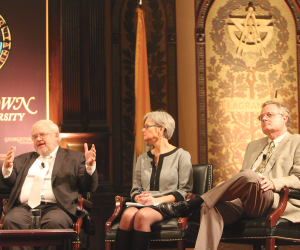
Catholic leaders discussed Catholic social thought in Gaston Hall on Thursday.
A panel of leaders of Catholic publications spoke about divisions within the Catholic Church and Pope Francis’ ideas for unification of the church in an event sponsored by the Initiative on Catholic and Social Thought in Gaston Hall on Thursday evening.
The panel, moderated by Director of the Initiative on Catholic Social Thought and Public Life John Carr, included five leading figures in the Catholic magazine world including Fr. Matt Malone, S.J., the editor-in-chief of America magazine, Paul Baumann, editor of Commonweal, Rusty Reno, editor of First Things, Caitlin Hendel, President and CEO of National Catholic Reporter, and Greg Erlandson, president and publisher of Our Sunday Visitor.
Theodore McCarrick, an Archbishop Emeritus of Washington, D.C., delivered opening remarks. He explained that current divides in the Catholic Church have the potential to be fixed by discussion and compromise.
“Pope Francis has given such powerful momentum and clear direction for our work, tonight’s topic is a reflection of his vision and example,” McCarrick said. “He warns us against temptation and the dangers of ideology.”
Reno began by discussing Catholicism and its relationship with the economy, explaining that the church is not doing enough to encourage equality.
“I think the Catholic Church can support, we are able to support, free markets without the illusion that getting rich is enough,” Reno said. “Without the illusion that the markets are going to take care of, discharge automatically our responsibility to our neighbors. That’s something we can contribute to a society that is very tempted by kind of libertarian fantasies.”
Reno also brought up the role of the Catholic Church in American society, and said that a growing group of Americans see the church as an obstruction.
“[There is] a growing recognition that in our society, the Catholic Church is in the way,” Reno said. “It’s in the way of a lot of things that powerful people want. It’s in the way of abortion on demand, it’s in the way of euthanasia, it’s in the way of radical uses of reproductive technology, you know, we’re in the way. …Our concerns of the weak and the vulnerable are in the way. And we’re being pushed out of the way. I think we can’t, in fact, retreat because we’re too big.”
Hendel noted the contrasting political ideologies of Catholics and spoke about the difficulties religious voters face when choosing a candidate.
“I think that for Catholics because there is such a divisiveness among them, that it paralyzes us as a political influence,” Hedel said. “Just the pro-life issue itself makes it very difficult to choose a good gubernatorial candidate because you have you know the one that is pro-life as far as abortion issue goes but then you have the one that is pro-life as far as the death penalty goes. They are rarely on the same ballot.”
Malone said that the panel showed such a diversity of opinion because people often only read news sources that correspond with their belief system.
“We are getting our news and information from sources with whom we are already likely to agree, that we have already clicked like on,” Malone said. “And so, it’s actually making the discourse worse. All the more important then, that I think that Catholic media organizations try to provide a model of a discourse that is different.”
Malone said that despite this, all Catholics have a solid base on which to unify.
“What we have in common, fundamentally, I think, and it’s been alluded to here, is our commitment to God and Jesus Christ. [That] is crucially important,” Malone said.
Chris Grillo (SFS ’17) attended the event and said he was intrigued by the discussion, especially when the panelists spoke about religion’s relationship to politics.
“I’m interested in looking at the intersection between faith and politics, specifically in the era of Pope Frank,” Grillo said. “Any democratic society requires a certain element of faith that requires morals for its citizens to fall back on, and I think that Catholic faith is a good place to start.”














